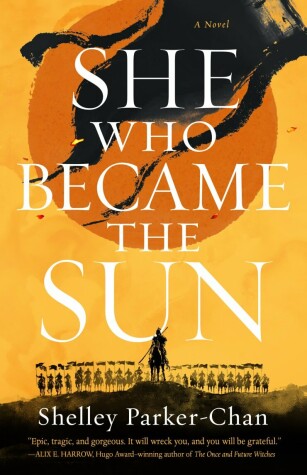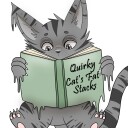
nannah
Content warnings:
- cissexism
- ableism
Representation:
- half of the POV characters are Chinese; the other half are Mongolian
- the MC and her love interest are sapphic; the MC seems to be asexual or stone butch
- the love interest is a nomad
In 1345 China, Mongol rule has left the peasants of the Central Plains starving and at the mercy of bandits. Of the Zhu family's nine children, only two are still alive. The brother is bestowed a great fate from the local fortuneteller, and the sister is told she is nothing. But when the bandits come, it is the brother who falls into nothingness—and the sister, desperate to survive, seizes his name and his fate. In her search for the greatness her brother was promised, she will become a monk, a general, a wife, an archenemy, and—revealed at the very end—an actual figure in China's history. She will do anything to seize her brother's greatness.
What struck me initially about the book was the prose. I love how mature and yet how readable the style is and how it bursts with character. It's not just written to be played in my head like a movie (and no, those writing styles are not worse in any way, I just have a soft spot for books that don't necessarily mean for the readers to insert themselves inside them). I also love how—and other people may disagree with me—the characters think more like people would in the actual 1300s rather than trying to tone down some of the things we know now to be pretty offensive or unfair. Like the protagonist, Zhu, obsessing over her gender, but also often limiting her gender to her body—i.e it's her female body that carries her "nothing fate"—even though the author themselves is non-binary and probably doesn't do this in real life (I'm assuming).
In a book for younger readers, I would probably think differently, but I'm glad Parker-Chan trusts their adult audience to be able to discern the difference between a character from a different time period and their own views. I've read so many books were the author either doesn't trust their audience enough or isn't brave enough (or their agent/publisher wasn't brave enough) to write characters who don't have current-era views. It can be exhausting to read morally correct characters in every single story. Or at least where the main character is the moral center of a story.
As the book progresses, though, the prose descends into telling and summarizing either things I wish it could show or just summarizing way too much. Add to that and exhausting amount of repetition of Zhu's desire for GREATNESS and how nothing else matters and how she will do anything to achieve this because this is her fate and she will be GREAT. It's hard to completely be on board with her goal, too, because unlike at the beginning when she took her brother's fate in order to survive, I just can't understand completely why she wants to be so great. I don't need to empathize with a main character's goal, but I do need to understand why the character would want it. This problem and the way she and her archenemy Ouyang, the eunuch general fighting for the Mongols, seem to be able to read five different emotions in a single eye twitch became pretty tiring.
Which is too bad, because I really do love how these (actually) morally gray characters think and interact to create this epic historical drama like the ones I like to watch—and the ones that the author actually admitted to inspiring this work, which makes sense.
I also do love the way Zhu and Ouyang's storylines parallel each other, especially when it comes to the way they feel about their gender. I think gender (and dysphoria) was particularly handled masterfully in this book, to be honest. It was my favorite thing about the whole story.
I think overall the book needed more editing. Maybe it was rushed or maybe the author was too fond of what she'd written, but it never does actually stick in one style and then places feels too clumsy. For everything that I love, there is something else that I have the urge to critique. But I do believe that Parker-Chan could become an incredible writer, because what they do well they do so damn well. I'm definitely going to read whatever they write next.


